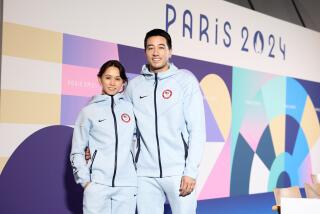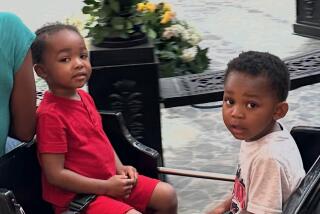Two lithe crew
- Share via
Chris Clark hardly could believe his eyes -- or his luck -- when he spotted Grant and Ross James standing in line at freshman registration.
As he did each summer, the University of Wisconsin rowing coach went to orientation in pursuit of potential recruits, searching the crowds for freshmen who were at least 6 feet 2 and looked as if they could help his program. He always found a few who piqued his interest, but he never had come across anything like the James brothers before that fate-twisting day seven years ago.
At 6-5, the twins had the broad shoulders and long arms that serve rowers well. Clark didn’t care that they were thin, seemed a bit bookish and knew nothing about rowing.
He saw only that they were twins. Tall, wonderfully wingspanned twins. The answer to every college rowing coach’s prayers.
“I found the Holy Grail,” Clark said.
Clark approached and asked if they’d be interested in joining the rowing team. The brothers figured why not. They had always been up for an adventure, especially when it involved the outdoors and being together.
They walked on to the team that fall, placing them on an unlikely path. Over the next seven years, they would help Wisconsin row to a national championship, win gold in the eight at the 2008 Under-23 world championships and compete with the senior team at the 2009 and 2011 world championships.
In May, they helped the U.S. men’s eight earn an Olympic berth in a last-chance qualifying regatta in Switzerland. The victory punched the 24-year-olds’ ticket to London and ended months of worrying over the boat’s inclusion in the Games.
“It’s still sinking in for me,” Grant said during a break from training with the U.S. team in San Francisco. “In my mind, the Olympics were always something that other people did. This isn’t something I ever imagined when I was a kid.”
Growing up in a small town in northern Illinois, the twins largely stayed away from competitive sports. Though they played baseball for a bit, neither had any interest in basketball despite their height and the constant courting from coaches.
Their mother, Cindy Warren-James, loved the outdoors, and her sons inherited her passion. When they weren’t in school, they were outside playing, hiking or climbing.
“We were never forced to be outside,” said Ross, who is four minutes younger than his brother. “But we were always happy to be out there.”
The twins -- who are fraternal but look a lot alike -- were inseparable as children, though not necessarily by design. Their mother gave them the freedom to pursue individual activities, but the boys always seemed to share the same interests.
In separate interviews, the brothers spoke reverentially about their mother, who raised them by herself, put them through an out-of-state college on a first-grade teacher’s salary and fills their inboxes with encouraging emails almost daily.
She got them involved with the Boy Scouts, which so perfectly suited the twins’ interests that both attained the rank of Eagle Scout. When the boys became interested in shooting through the scouts, she found a competitive shooting program for them. They won high-power rifle marksmanship national championship titles in 2006.
“I just looked for opportunities for them to be very well-rounded,” Warren-James said. “Once we found opportunities that suited them, they worked hard and learned quickly, and as a result things happened for them.”
When the twins became rowers, Warren-James again offered her unwavering support. She liked the idea of their being on a college team to have a support system on Wisconsin’s large campus. She quickly learned the sport, brushing up on terms such as port and starboard so she could better understand her sons’ responsibilities in the boat. (Ross rows on the port, or left, side; Grant rows starboard.)
During the twins’ sophomore year, their coach began to see their full potential. Clark still couldn’t tell them apart -- the brothers would draw an “R” or a “G” on their backs when using the rowing machines so Clark could differentiate them -- but he knew they had something special.
“Biometrically, they have absolutely perfect proportions for rowing,” Clark said. “They’re like machines, like they were made in a lab or were part of the old East German model. They’re on task 100% of the time. You could drop a bomb in the water, and they would be unfazed.”
But it’s more than the brothers’ body type that makes them special. It’s their synchronization, their ability to stroke in unison.
In other words, it’s the fact they’re twins.
“As coach, you’re always seeking people who can be in unison with each other,” Clark said. “When you have two guys who were born in unison and have been in unison their entire lives, it’s a huge benefit.”
By the time both brothers graduated from Wisconsin with engineering degrees, they were members of the U.S. rowing team and considered possible candidates for the 2012 Olympics. They rowed on the 2011 world championship team, which finished eighth and did not secure an automatic berth for the London Games.
It marked the first time in the modern era of the Olympics that the U.S. men’s eight failed to qualify during the previous year’s world championships. Led by a new coach and boasting several new rowers, the boat earned the final Olympic spot at the win-or-stay-home regatta two months ago.
“We told ourselves that we only get one race and we have to win it,” Ross said. “There was no other option.”
The twins now are focused on London, where they’ll take to the water July 28 at Eton Dorney. They assume they’ll bunk together in the athletes’ village, as coaches almost always pair them up on the road.
“Everyone assumes that we’re joined at the hip or something,” Grant said. “They always feel like we’re twins, so we would want to be together.”
And, truth be told, they sort of do. With the exception of a couple of years in college, they’ve roomed together their entire lives. They know each other’s idiosyncrasies, have similar sleeping schedules and rarely argue, making them ideal bunkmates.
It’s much the same on the water, where each brother feels better knowing the other is in the boat with him.
“With any teammate, you row together long enough and you gain that bond of trust,” Ross said. “With Grant, it’s an entirely different level of understanding. Wherever he is, I know he’s giving 110%, and he knows the same about me. Honestly, it’s pretty special.”
--
More to Read
Go beyond the scoreboard
Get the latest on L.A.'s teams in the daily Sports Report newsletter.
You may occasionally receive promotional content from the Los Angeles Times.






